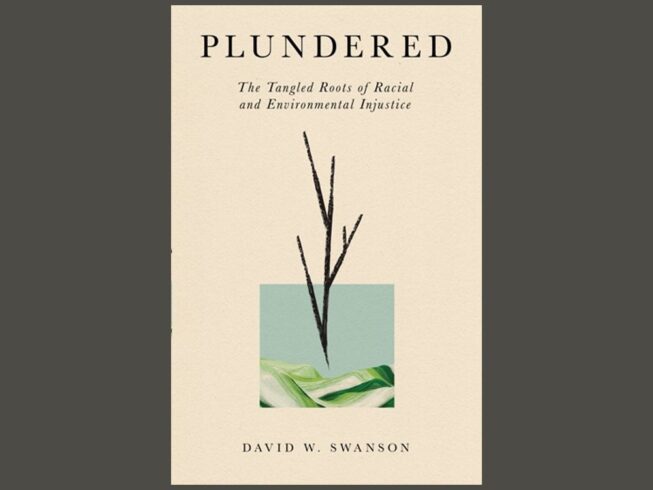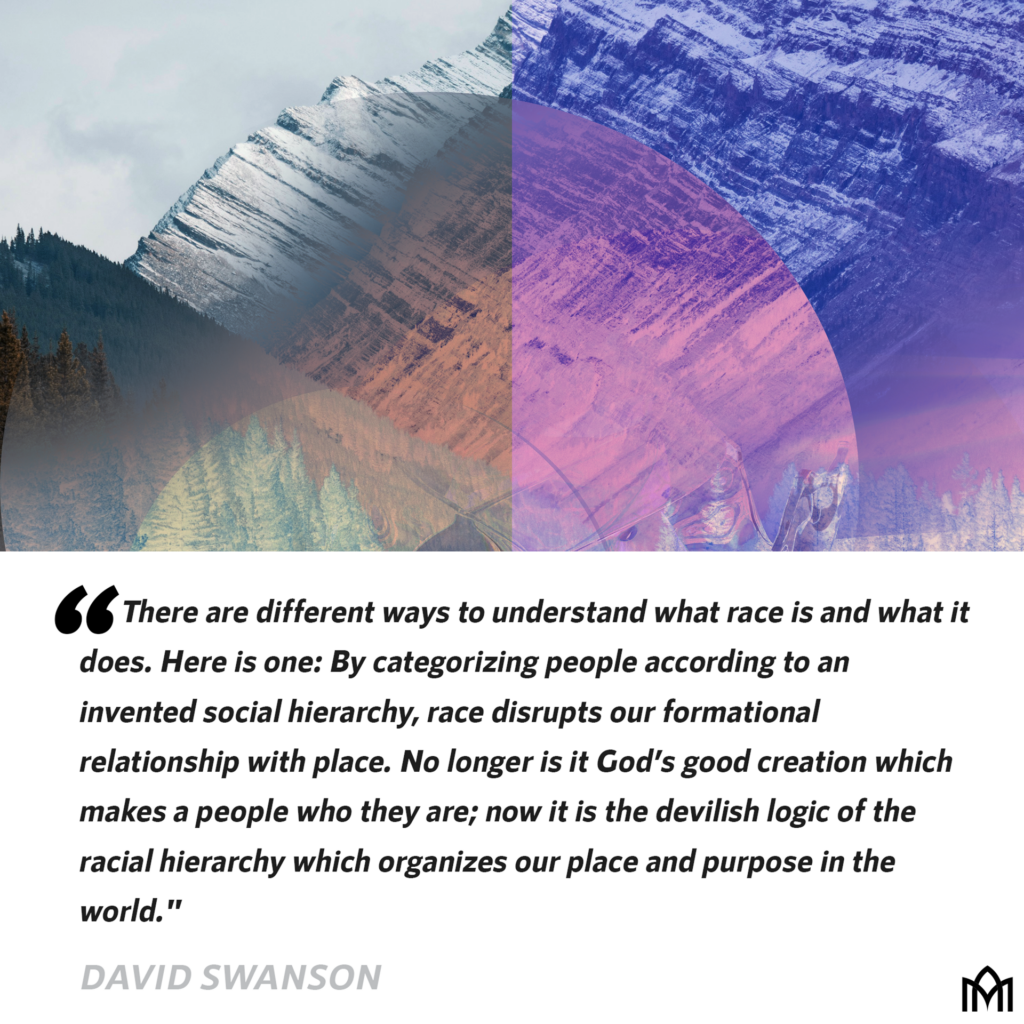Reconciling to Place
Plundered: The Tangled Roots of Racial and Environmental Injustice
*Editorial Note: Plundered: The Tangled Roots of Racial and Environmental Injustice, written by long-time friend of Missio Alliance and Leading Voice David Swanson, releases wide today, October 08th, 2024. Plundered is a new release in the ongoing Missio Alliance & IVP Book Series, and we are so expectant in recommending David’s book for purchase! ~CK
How Race Disrupts Our Formational Relationship with Place
During the past fifteen years our multi-racial church has lived through many instances of racist trauma: notorious occasions of police brutality, attacks on African American churches, women murdered because of their ethnic identities, xenophobic rhetoric and policies, and more. These don’t include the less blatant, more local expressions of our racialized society; school funding formulas, housing costs and gentrification, and proximity to toxic waste and polluted air are all tainted by the exploitative logic of race.
Each of these spectacular instances and quieter expressions impact the people in our congregation. Attempting to nurture Christ’s reconciliation in our community, while being buffeted by the unpredictable but always looming gusts of racial violence, can feel like we’re just barely holding onto one another.
There are different ways to understand what race is and what it does. Here is one: By categorizing people according to an invented social hierarchy, race disrupts our formational relationship with place. No longer is it God’s good creation which makes a people who they are; now it is the devilish logic of the racial hierarchy which organizes our place and purpose in the world.
Typically, our racial reconciliation paradigms have accounted for how race separates individuals and groups from one another. Ministries committed to reconciliation work to understand histories of segregation and supremacy and how those legacies continue to exert their influence. These ministries admirably make room to learn those in their communities who have been most overlooked and harmed by the racial hierarchy. The goal is to close the segregating gap, to allow the God “who reconciled us to himself through Christ” to reconcile racialized people to one another (2 Corinthians 5:18).
More recently, reconciliation ministries have also begun accounting for the extractive purpose of race. By identifying some people as more or less human, race justifies theft. We live in the aftermath of land and labor stolen from people whose position on the racial hierarchy consigned their communities to kidnapping, enslavement, and genocide.
There are different ways to understand what race is and what it does. Here is one: By categorizing people according to an invented social hierarchy, race disrupts our formational relationship with place. (1/2) Share on X
No longer is it God’s good creation which makes a people who they are; now it is the devilish logic of the racial hierarchy which organizes our place and purpose in the world. (2/2) Share on X
In our supposedly colorblind, society, the racial kleptocracy has evolved into subtler expressions. For example, in Race for Profit Keeanga-Yamahtta Taylor has shown how, after the Fair Housing Act of 1968 prohibited lending institutions from excluding buyers of color, banks adopted a policy which Taylor describes as “predatory inclusion.” Armed with federally insured loans, banks targeted Black communities with risky mortgages for substandard housing. Defaulted mortgages were backed by the federal government ensuring that banks could place the dilapidated housing back on the market. Having been previously excluded from the housing market, African American communities were now included for the same extractive purposes.
Paradigms that reconcile previously segregated people are good. Even better are ministries which understand the widescale theft which race has justified. Such communities will invite communities into loving relationship while reckoning with power differentials and legacies of material plunder. Yet for all of the good done by this sort of reconciliation, it misses one of the fundamental impacts of race and thus misses an opportunity for deeper, more holistic, and lasting reconciliation.
To discover what has been missed, it’s helpful to remember that culture, ethnicity, language, and other attributes of human development all flourish in response to God’s creation. It is a people’s relationship to the specifics of their places – climates, soils, geographic features, plant and animal species, and so on – which makes them who they are. This interdependent relationship between people and place is God-intended. As we fulfill our purpose of caring for the places we inhabit, those places also care for us, providing for our needs and shaping how we reflect God’s love to our local ecosystems and neighborhoods.
But race undoes the good formational power of creation for the deforming arbitrariness of a social hierarchy. Race exerts a severing force, segregating people not only from one another but also from a meaningful relationship with our places. So thoroughly has a race shaped us, we typically don’t even think about how strange it is to live so detached from God’s creation.
God has been faithful to our church and, in our weakness and foolishness, brought us further in our reconciliation journey. And yet, like so many other communities longing for reconciliation, we’ve often overlooked one of the primary functions of race – its creation-severing power. Recognizing this has allowed us to begin sinking our roots into our place and find that creation is still capable of sustaining, stabilizing, and shaping God’s people.
Understanding that one of the infernal purposes of race is to replace creation’s good formational power with its own exploitative hierarchy allows us to expand our reconciliation imagination. Knowing that Christ reconciled us to God, one another, and creation provides the solid and nourishing ground for the ministry of reconciliation.
By identifying some people as less human, race justifies theft. We live in the aftermath of land and labor stolen from people whose position on the racial hierarchy consigned their communities to kidnapping, enslavement, and… Share on X
Paradigms that reconcile previously segregated people are good. Even better are ministries which understand the widescale theft which race has justified. (2/3) Share on X
Such communities of reconciliation will invite communities into loving relationship while reckoning with power differentials and legacies of material plunder. (3/3) Share on X
How might we being to move into this more rooted expression of reconciliation?
- First, we can invite those in our congregations to stay. In our churches, yes, but also in the ecosystems and neighborhoods we share together. For many contemporary people, transience and mobility are assumed. Graduate school, a better paying job, or a more pleasant climate are all reasons people decide to leave behind congregations and communities.
In a world in which race has removed us from affectionate obligations to our places, decisions to move are perceived as being value neutral, neither good nor bad just a fact of contemporary life. (Of course, the racialized plunder of our world also asserts its will on those without the privilege of mobility; some are trapped in unhealthy, toxic environments while others are forced from homelands as migrants and refugees.) But a people who understand that Jesus has reconciled us to creation and that creation is always placed and particular, this people will opt-out of society’s temptation to leave. And then to leave again. Rather, we’ll learn that cultivating collective rootedness is always better than chasing ethereal dreams alone.
- Second, we can learn how our places care for us. The severing nature of race is aided by industry and technology which distract us from our dependency on God’s creation. Our food, transportation, entertainment, and work are no longer obviously connected to the natural world. The innumerable hours many spend in front of screens for work, leisure, companionship, and therapy add to our alienation from the gifts of creation which constantly sustain us. But our learned ignorance does not change our dependence on Creator and creation.
Residents of dense urban centers, sprawling suburbs, or rural communities will all benefit from remembering how God’s handiwork sustains us. “By the word of the Lord,” writes the psalmist, “the heavens were made and all their host by the breath of his mouth” (Psalm 33:6). Living into their reconciled identities, congregations made up of members who are each humbly aware of how creation cares for them will be collectively formed by their places. Learning to truly see our places – the watershed, the microclimate, the landmarks set aside by the peoples preceding us – makes our dependence on creation unmistakable. Grateful dependence works its way into our memories and prayers. This shared, conscious dependence expands the ministry of reconciliation to include the natural world. It is this relationship with creation which allows a people reconciling across racial division and hostility to find their solid footing.
- Finally, a congregation can discern its collective caretaking, or stewarding, vocation. Having committed to a long-term and interdependent relationship with their place, a reconciling community can begin to prayerfully determine how best to care for it. Our church’s nonprofit organization provides peace circles for our local public schools, organizes an annual back-to-school fair, and tends a local garden which provides fresh vegetables for our neighbors. None of these services were predetermined; they are not the results of any one person’s vision. Rather, these expressions of loving care were slowly discerned as our roots grew more deeply into our neighborhood’s soil. What will our congregation’s caretaking look like in ten years? I can’t wait to find out!
Being reconciled to creation opens possibilities for caretaking which a racialized people might otherwise miss. As they care for their places, conduits of the Creator’s blessing and love, these racially diverse women and men are shaped together into a placed community. They will be made into a unique, reconciling people by their affectionate relationship with the place they are learning to care for. And while I doubt the severing power of race will completely disappear before our Savior’s return, in these communities its force will be blunted by the generative power of creation.
///
Understanding that one of the infernal purposes of race is to replace creation’s good formational power with its own exploitative hierarchy allows us to expand our reconciliation imagination. (1/2) Share on X
Knowing that Christ reconciled us to God, one another, and creation provides the solid and nourishing ground for the ministry of reconciliation. (2/2) Share on X
*Editorial Note: If you’d like to read an excerpt of David’s new book, Plundered, the first chapter is available for download here: The Gift of Creation (Ch. 1, Plundered) | David Swanson. ~CK





